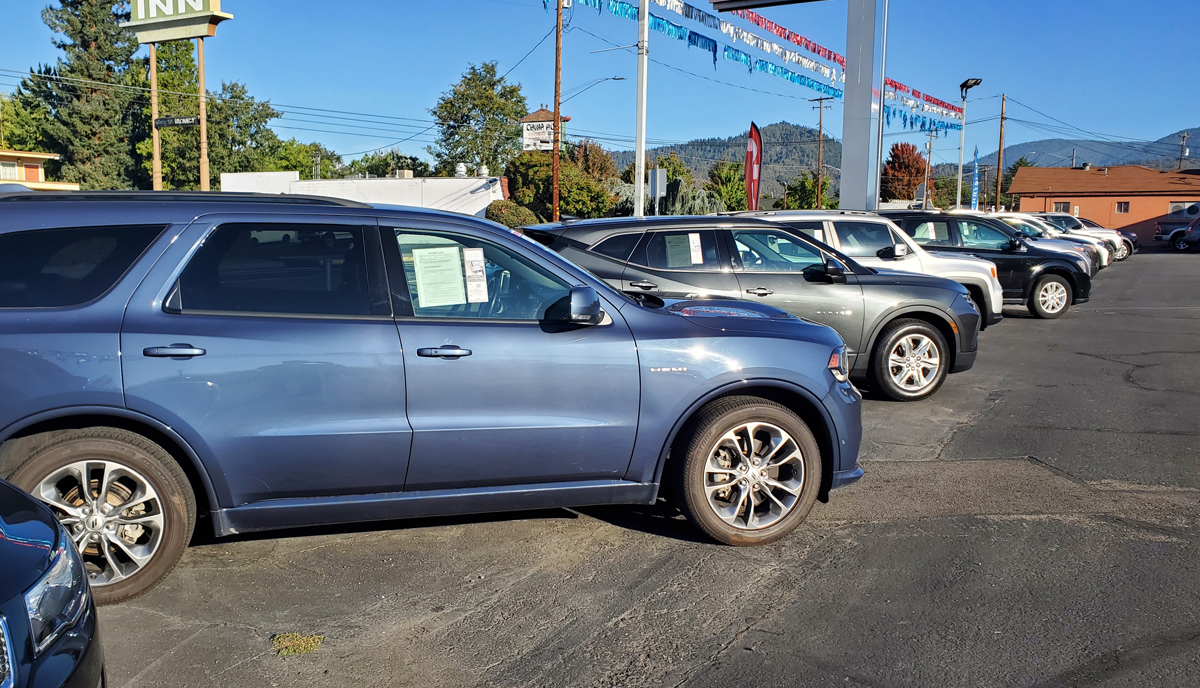Much of the financial blogosphere perpetuates the mistaken notion that it is never acceptable to buy a brand new car. They say all car purchases need to be used cars that are at least 2-3 years old. They are operating under the misguided notion that people should do everything the cheapest way possible.
Can you imagine what that advice would look like in other areas of life? When you go out to eat you can never order the lobster because chicken is cheaper. When flying you can never fly first class or business class because coach is cheaper. When going to the beach on vacation you can never go to Hawaii because Virginia Beach is cheaper. You can never buy that beautiful new blouse you love if it is not on the clearance rack.
I don’t hold to this rigid notion. There are times to save money and purchase the less expensive option. But there are other times when it is more enjoyable to spend more and get exactly what you want. The enjoyment factor needs to be taken into account with every purchase, and automobiles are no exception.
I recently went to Orlando and chose to stay at a nearby timeshare for a $1,000 savings over the price of staying at the hotel hosting the conference. The timeshare was only four miles away and it took almost as long for me to get to the convention center in an Uber as it did for those staying in the hotel to walk across the campus to get to the same venue. I saved a lot of money with this decision without much effect on my hassle factor. If you want to learn more about how I save a fortune on vacation accommodations, then read my new book A Guide to Loving Your Timeshare and learn all the hacks that make timeshares your best vacation option.
If the closest timeshare to the venue, that would allow me to save $1,000, would have been 30 miles away, I would have chosen to stay at the hotel and paid more for the convenience. Sometimes the convenience, and the ability to have something exactly like you want it are worth the added expense. Other times, it is not worth the price.
Following are the things you should consider when you feel you want to buy a brand new car, even though it might cost more than a used one.
The Purchase Can’t Break the Budget
The most important consideration is your family budget. You must have enough wiggle room in the budget to consider buying a car, used or new. I have witnessed people blowing their budget for the privilege of buying a new car. No matter what the deal, zero down, no interest for 18 months, 0% financing, $5,000 for your old car, or any other gimmick they might use to hook you, you must not make a move that puts your budget in the red.
If you live paycheck to paycheck, you have no business buying a brand new car. You must first get your spending under control so you can afford a new purchase.
If you have money saved that is earmarked for a car, and you found your dream car, new or used, then you certainly can move ahead with the purchase.
What is the point of having a big income, if it isn’t used to make you happy? Money does not buy happiness, but there are a lot of things we can buy that make us happy. That is why we pay to go on vacation, to do something that makes us happy.
If a car will make you happy, and you have the money, you are free to consider all options you can afford. If you can find what you want used, you will save money. If you can only find what you want new, then don’t feel guilty about paying a new car premium.
You Must Have the Money to Make the Deal
I learned a long time ago there is a big difference between being able to afford to buy something and being able to afford the payments.
When I was a second year resident, I went in search of a new car because my 14 year old car was going to the shop too often and I didn’t have time to take it in with my 110 hour work week. I needed a more reliable car. Since I was now earning money, I thought I could afford a car payment. I test drove a brand new Mercedes sedan, a great doctor car, and fell in love with it.
I went home and considered making the purchase. Yes, I could swing the payments, which also came along with higher oil change costs, higher insurance….. The more I thought about it, the more I thought about all the other things I could do with that money. The reality was I could not afford to spend that much money for a car (more than a year’s income) on my resident salary, even if I could stretch out the cost by using those low monthly payments. Likewise, a new attending cannot usually afford to buy a luxury car until after they have tackled their student loans.
After coming to my senses, I bought a very similar car, a one-year old Ford Taurus, for one third the price of the Mercedes. I was very happy with the new to me car, and I no longer had to take my car to the shop. Since both cars would equally meet my needs, I chose to save money and I bought the used one that time.
Don’t get fooled by the low monthly payments or low interest loans. Don’t kid yourself into thinking you are doing a good thing by financing an expensive car for 1.5% interest, while investing cash to earn an 8% return. If you feel the investment is important, spend the money on the investment and don’t buy the car at all and avoid not only the interest but the principal as well. Interest arbitrage is usually a justifying excuse for buying an expensive car we can’t afford. Don’t fall into that trap.
Make sure to buy a car that you can pay for with cash.
The Purchase Won’t Blow Your Goals
Sometimes we get so caught up in the thought of buying something new, we forget about all our other goals.
If the brand new car requires a dip into your emergency fund, then take a pass and keep the emergency fund intact for a true emergency. If the extra cost of buying new means you will not be able to go on the vacation you have been saving for, then the cost is too high. There is a reason you have set goals you are striving for. Don’t let dreaming of your next car purchase make you lose sight of them.
Someone came to me for coaching advice who wanted to make a big purchase, but also had a goal to retire in two years. She wanted me to help her decide if the big purchase would delay her retirement date. We looked over the numbers and it was clear she could make the purchase and still retire at the time she had planned. Now she could go forward with spending the money without any regrets.
If the extra cost of buying a new car instead of a used one will not waylay your goals, then don’t feel guilty about paying the extra money for that new car. Spend your hard earned money and enjoy the fruits of your labor. After all, that’s exactly why you earn money isn’t it?
I have purchased several cars over the years, some have been new, and others were used. All of the purchases made me happy. I was either replacing an older car that was spending too much time in the shop for a newer one that did not require going to the shop, or I was replacing a car because my car use had changed.
When life changes, sometimes that means it is time for a car change. Having children means needing more room, buying your first home may mean you need a pickup truck for hauling things, buying a boat may create a need for more towing capacity, and an empty nest might mean it’s time for the sports car you’ve always dreamed of.
If buying a new car will make you happy, without breaking your budget, and you buy it with cash, there is no reason to feel guilty about your purchase. Go buy the car and enjoy it. Life is too short to hinge every decision on the price. Sometimes you really can afford to buy the new one, and don’t let anyone make you feel bad for spending the extra money.






I spent part of my career as an actuarial trainee in an insurance company. Every actuary and claims professional I knew always bought new cars and then kept them a very long time .
The argument that you must buy a two or three year old car is based on the “cost of depreciation”. If you keep your new car a long time, that is irrelevant. Every engineer I know buys new a
and drives them 15 years. . Over the course of a lifetime the savings are significant if you buy new and keep a very long time. My current car is 15 years old and has had very little in terms of repairs.
Kim,
Thanks for your comment. You can do the same whether you buy a car new of 2 years old. I’ve purchased some new and some used but like new. I too drive them for a long time. I recently traded in my 17 year old motorhome for a new-to-me 1.5 year old motorhome. My daughter-in-law is driving my 24-year-old Toyota Avalon we bought new. My son is driving my 13 year old Toyota Prius we bought new. I’m driving a 18 year old Ford Expedition we bought new. My wife is driving a 6-year-old Jeep Cherokee we bought used (3-years-old) as a tow vehicle for the motorhome. We have saved a fortune by not trading cars every few years.
I don’t understand your comment about car loans.
If I am buying a car and I have enough cash to buy the car, why would I not take out a low interest loan and invest the cash if the market is good?
Why pay cash for anything if you can take out a low interest loan and invest the cash if you have a reasonably good chance to get a return higher than the interest rate for the loan?
Serjio,
You speak of the low interest loan trap. So many fall into it thinking they are leveraging an investment. Really can’t get deep into why this is a bad idea in a blog comment as there is not enough room. But you can read more in my book The Doctors Guide to Eliminating Debt.
Buying the car and making an investment are not linked events. If you really feel you need the investment, then make the investment and don’t buy the car at all. Mostly the low interest becomes an excuse to buy a new car with debt (Meaning a car you can’t afford so you had to borrow the money to do it). If you have the money and want the car then pay for it.
People who do what you suggest fall into the trap and become perpetually in debt. Because they can do that for everything. Use their cash for investing and borrow other people’s money to buy stuff. Then they pay extra for everything they buy.
You won’t become wealthy by doing what you suggest. It doesn’t even move the needle. If the investment goes up then you make a little money that you owe taxes on. If the investment goes down, then you lost on the deal and can do tax loss harvesting to lose a little less.
I only use other people’s money when the borrowing and the investing portions of the deal are linked: Borrowing to buy a rental property that produces positive cash flow. Then not only am I getting a return, but the investment is the one making the payments. The interest paid goes against the cash earned.
That is not the same as borrowing money to buy a car and pretending that it is actually an investment deal. Get out of the business of paying interest and into the business of earning interest.